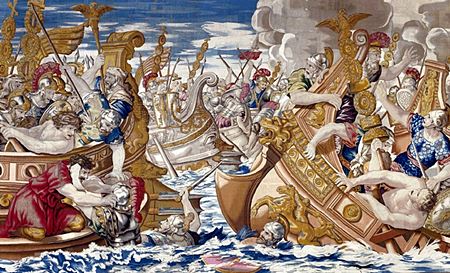
Battle of Hellespont(Battle of Byzantium) |
year: 324 July 324 |
| Destruction of the fleet of Licinius by Constantine’ s fleet | ★ ★ ★ ★ ★ |
|
enemy: Romans (Civil War)
|
location: At Hellespont, near Gallipoli, at the Turkish straits
|
accuracy:
●●●●●
|
|
battle type: Naval Battle |
war: Civil Wars of the Tetrarchy (306-324 AD) |
modern country:
Turkey |
| ▼ The Byzantines(emperor: Constantine I the Great) | ▼ The Enemies | |
| Commander: | Crispus (son of Constantine I) | Abantus |
| Forces: | 80 ships | 200 ships |
| Losses: | 196 ships were destroyed |
| Background story: |
| Emperor Constantine renewed the war against Valerius Licinius, Emperor in the East, and defeated his rival at Adrianople, then immediately besieged him in Byzantium. Licinius left a strong garrison in Byzantium but ferried the greater part of his troops across the Bosporus to the Asian shore. Constantine, if he wished to cross to Asia in order to destroy Licinius’ means of further resistance, had to gain control of the sea crossings. Licinius’ main army was on the Bosporus coast to cover this crossing point, whilst the bulk of his navy was moved to cover the Hellespontine narrows. |
The Battle: |
 The Sea Battle in Hellespont, Pietro da Cortona (1635) Abantus then withdrew to the eastern end of the Hellespont to regroup his forces. Crispus augmented his fleet with reinforcements from the Aegean Sea and the two fleets met again on the following day. The second clash was fought near Gallipoli; a storm blew up which, fortuitously for Crispus, wrecked many of the Licinian vessels on the shore. Abantus' ship was sunk and he only managed to save himself by swimming ashore. All but four of the ships of the Licinian fleet were wrecked, sunk or captured. The Constantinian fleet won an overwhelming victory. |
Aftermath: |
| This naval victory allowed Constantine to cross the Bosphorus with his army, using a fleet of light vessels. When Licinius learned of the destruction of his navy, he withdrew his forces from the eastern shores of the Bosporus and moved southeast. Constantine's next victory in the Battle of Chrysoupolis that followed was the last of this civil war. |
|
|
